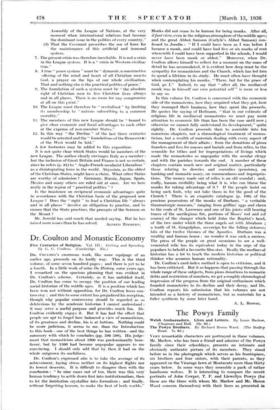They that Take the Sword: The Future of the League
or Nations. By Douglas Jerrold. (The Bodley Head. 6s.)
Revamping the League
Ma.. JERROLD writes with such pungfency-and abandon and indulges in so much cut-and-thrust on the road to his logical conclusion that it is not always easy to follow the drift of his argument. But it seems to sum itself up in the following propositions : 1. The essence of civilisation is liberty, which is to be understood as the recognition of human personality.
2. Christianity is the only religion which fully recognises human personality. Therefore " the Christian society is not merely a free society, it is the only free society which has ever existed or endured."
8. The liberty of the individual and the well-being of society are " in constant opposition," today and " at every stage of human history."
4. This opposition has been particularly acute during " the last three centuries of European history." These centuries have " witnessed a progressive restriction of human freedom, a progressive assault on the dignity of man, a denial, increasingly positive and strident, of the supremacy of God in the society of men."
5. This assault on human liberty reached its culmination in the organisation of the League of Nations. IL The principal defects of the League of Nations are : (a) That its membership is open on equal terms to all States, regardless of their degree of respect for liberty. Thus, " the status of China, Mexico, Abyssinia, Liberia or Russia " in the Assembly " is equal to that of Holland, Switzerland, England (sic) or France," and we have witnessed the spectacle of " two of the great persecuting States " occupying permanent seats on the Council.
(b) That it is committed to the principle of non- intervention in the internal affairs of its members— a doctrine " repugnant to the whole tradition of Christian civilisation." " The laws of God and the laws of Nature are alike unknown to the jurists of the League." " Altars may be desecrated, priests, ministers, missionaries, and nuns may be murdered and robbed, but so long as the murderers come to Geneva to make up a quorum, all is well."
(c) That, by removing the scene of action from the national stage to Geneva, it divorces the people from the control of foreign affairs. " Secret diplo- macy is trebly secret today because it is carried on behind an impudent façade of open negotiation." " The statesmen of Versailles . . . submitted the peoples of the world to the grossest form of tyranny when they handed them over to the Council and
Assembly of the League of Nations, at the very moment when international relations had become the dominant issue in the politics of every country."
(d) That the Covenant prescribes the use of force for the maintenance of this artificial and immoral system.
7. The present crisis was therefore inevitable. It is not a crisis in the League system.- It is a " crisis in Western civilisa- tion."
8. A true " peace system " must be " dynamic, a constructive offering of the mind and heart of all Christian men to God, a prayer on the lips of our whole civilisation. That and nothing else is the practical politics of peace."
9. The foundation of such a system must be " the absolute right of Christian men to live Christian lives always and in all places. There is no room for any compromise at all on this roint."
10. The League must therefore be " revitalised " by limiting its membership to " nations subscribing to a common morality."
11. The members of this new League should be " bound to give clear economic and focal advantages to each other at the expense Of non-member States."
12. In this way " the Decline " of the last three centuries would be arrested and the " foundations of the Renascene:: of the West would be laid."
A few footnotes may be added to this exposition.
It is not quite clear which States would be members of the new League. The author clearly envisages Italy as a member : but the inclusion of Great Britain and France is not so certain, since he refers (p. 81) to " Anglo-French secularist Liberalism " as a disintegrating force in the world. Abyssinia, as the oldest of the Christian States, might have a claim. What other States are worthy of admissitin ? Germany, Russia, Japan, Spain, Mexico and many others are ruled out at once. Are we here really in the region of " practical politics " ?
Is the insistence on reciprocal economic advantages quite in accordance with the Christian basis of the proposed new League ? Does the " right " to lead a Christian life " always and in all places " involve an obligation to practise, and to ensure that the State practises, the precepts of the Sermon on the Mount ?
Mr. Jerrold has said much that needed saying. But he has
raised more issues than he has solved. ALFRED ZIMMERN.















































 Previous page
Previous page